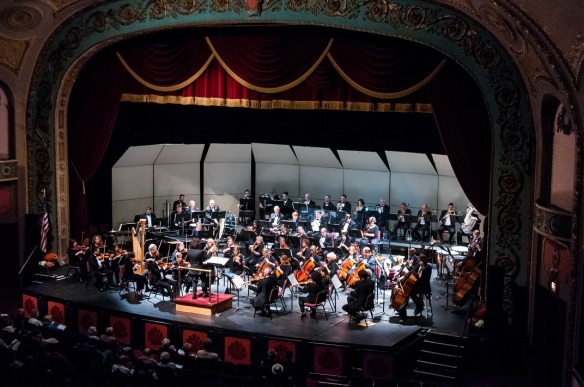
Is a renaissance about to begin at the Renaissance? Octavio Mas-Arocas opens the season as music director of the Mansfield Symphony Orchestra. (Photo by Jeff Sprang Photography, courtesy of the Mansfield Symphony.)
A review/commentary by Mark Sebastian Jordan
Last Saturday saw the beginning of a new era at the Mansfield Symphony and, I hope, in Mansfield itself. But before I comment on that, let me offer full disclosure: Not only do I give pre-concert talks for this orchestra, I was on the committee that selected its new music director, Octavio Más-Arocas. Beyond that, however, I want to caution that the thoughts expressed here are my own and do not represent the views of the Mansfield Symphony, the Renaissance Theater, or any other organization.
The music director search committee met many times as we waded through almost a hundred applications for the position. Those who habitually run down Mansfield may be surprised to hear that statistic, but the fact is inescapable that Mansfield has an extraordinary orchestra for a community of this size. It was formed back when this town had an industrial base and the wealth that came with it. The money is scarce today, but passionate dedication has kept alive an ensemble that has a fine regional reputation because it is staffed by players from all over the state, many of them professors, independent teachers, or advanced students.
Because of that reputation, a huge number of conductors were interested in working with the ensemble, so our committee had to examine every application seriously, research the conductors, and evaluate them in terms of quality and experience. After a daunting volume of applications were pored over and discussed, we reached a short list of candidates. After further debate, the shortlist was reduced to three finalists, each of whom conducted the orchestra last season. None of the candidates were bad, but some clicked with the orchestra more than others, and the electricity of the music making was an important factor.
In the end, it came down to an intense discussion of taking the most predictably safe route or daring to reach for a new level. Considering the difficult economy of recent years, the safe route was very tempting. But an ensemble with the potential of the Mansfield Symphony needs challenges to make it come to life and compel the community to pay attention to what it has to say. And the surveys of the orchestra’s musicians, combined with audience response, and our own interactions with the conductors led us to choose the young Spanish conductor Octavio Más-Arocas.
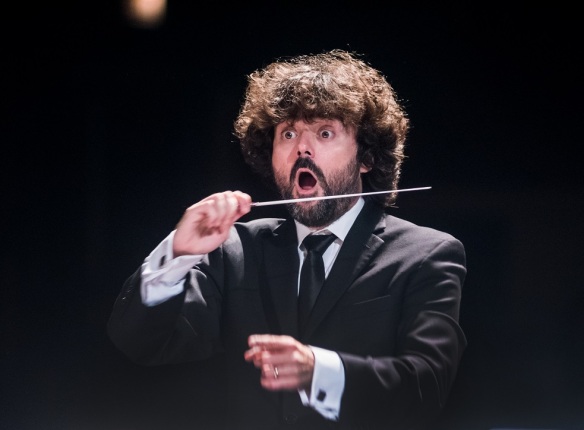
Sorcerer at work: Octavio Mas-Arocas leads the Mansfield Symphony. (Photo by Jeff Sprang Photography, courtesy of the Mansfield Symphony.)
I’m happy to say that as a member of the search committee, I feel fully vindicated by Saturday night’s opening concert. Any opening night has a bit of the feel of a gala about it, but this was something special. Octavio selected a program rich in musical storytelling, whether it’s the warm and funny tall tales of Zoltan Kodaly’s Hary Janos Suite, a clutch of delicious songs by George Gershwin, or the suite from Igor Stravinsky’s score to the ballet The Firebird.
I can’t remember the last time I heard the orchestra so expressive and engaged… well, wait a minute. Yes, I can: it was when Octavio came last year, conducting Elgar and Tchaikovsky with great emotion. On this night, though, the works were less abstract, more pictorial, and Octavio proved to be a master storyteller. The Hary Janos Suite is known for its rollicking humor, and Octavio let the orchestra have great fun with it, but he also caught the heartfelt warmth and whimsy of Kodaly’s affectionate music. The punchlines were there, but the stories came to life along the way.
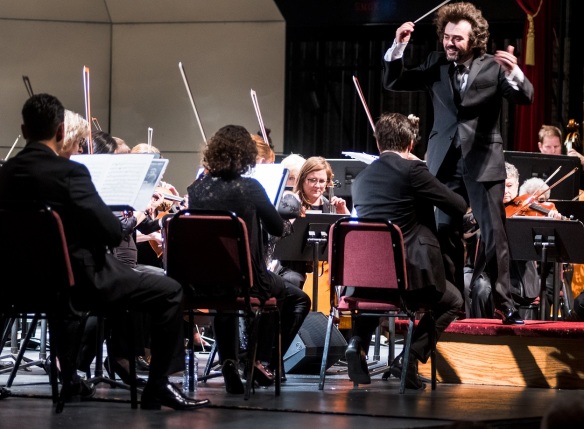
Octavio in full flight. (Photo by Jeff Sprang Photography, courtesy of the Mansfield Symphony.)
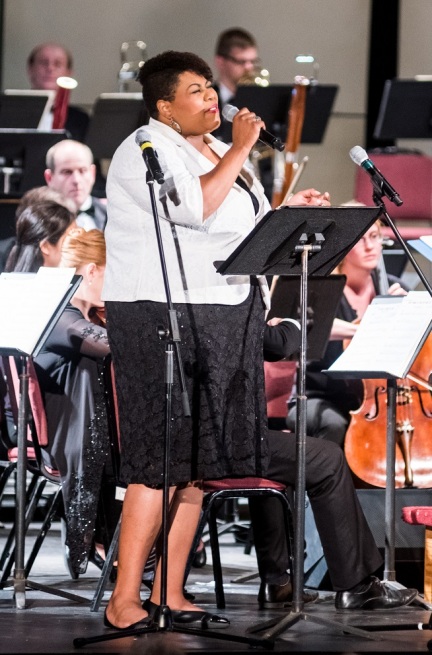
Condrea Webber sings Gershwin with the Mansfield Symphony Orchestra at the Renaissance Theater. (Photo by Jeff Sprang Photography, courtesy of the Mansfield Symphony.)
Then came a wonderful contrast: eight songs by George Gershwin, written around the same time as the other works on the program, but with a distinctive distillation of the American popular style of the early twentieth century. Each one told its own story, embodied by three first-rate soloists. Condrea Webber brought a pliant, dusky tone to her songs with just a classy hint of brass to convey sass. Brian Hupp brought debonair charm with his suave and at times melancholy shadings. Maddie Beer pulled the listener in magnetically with her bright, colorful voice. The orchestra savored each miniature glory, supporting and enhancing the singers’ characterizations, Octavio serving as true leader by putting the emphasis on the singers and players.
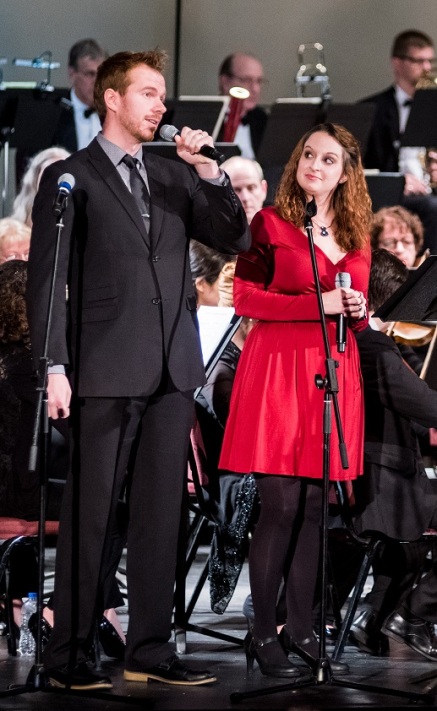
Brian Hupp and Maddie Beer. (Photo by Jeff Sprang Photography, courtesy of the Mansfield Symphony.)
Likewise, Stravinsky’s Firebird Suite sparked with magic, the conductor daring to stretch some phrases to near inaudibility, with other parts punched aggressively. Above all, it was music-making with personal inflection and vivid personality, making the music pop off the page to stand, living and breathing, in the mind’s eye. This conductor connects with this orchestra in a way that can take the listener into another realm, somewhere above the day-to-day drudgery of work and car problems and natural disasters and dysfunctional politicians. It can remind you that human life is full of a sparkling energy that, when directed productively, can open your eyes to the world around you, making your life (and the lives of those who deal with you) far better.
So, is it really that important? Does an ensemble playing music from the past matter in today’s tech-centric society? Well, that begs an overarching question, doesn’t it: Can you save the world with art? Basement-dwelling Internet trolls scoff, roll their eyes, and post another mocking meme. But you know what? Those trolls do the things they do because they are lonely. Instead of finding a connection with the rest of the world, they have been left behind, and their lashing out has played right into the hands of those who would destroy the United States from the outside by, it is beginning to seem, hacking into our election computers. Thirty-seven years ago, the most powerful job in the world was taken over by an entertainer instead of a real statesman, and a country weary from turmoil swallowed his bait. Since then, the debasement of our educational systems and the factionalizing of ideologies has made such a mess of things, the 1970s look like easy street. Today we don’t even have a real entertainer, just a washed-up reality show star.
I ask this: Has lowest-common-denominator capitalism and trickle-down economics helped anyone making less than seven figures a year? Has our world been improved by reality television and Hollywood remakes? Has tying teachers’ hands by making them teach to tests instead of imparting true wisdom made America great again? Has home-schooling The Rapture lifted anyone to the sky?
I will tell you this. With the creative insight of art, you can go right up to the sky and even beyond. The gravity of this heavy, gray world cannot hold you down when you take flight with inspiration. Pepe the sickly frog can come up out of his basement and finally live for real. All you have to do is dare to open your ears to a little magic. And right here, right now, Mansfield has just seen the arrival of a sorcerer.
